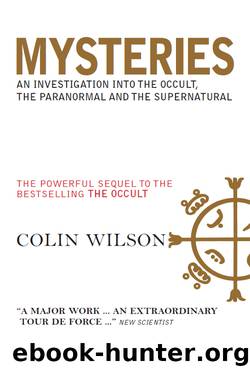Mysteries by Colin Wilson

Author:Colin Wilson
Language: eng
Format: epub, azw3
Tags: Mysterles
ISBN: 9781780286969
Publisher: Osprey Publishing Ltd
Published: 2013-05-07T04:00:00+00:00
6
Revelations
The work of AE raises the fundamental problem of ‘revelation’. Like all the mystics, he assures us that the world we see and touch is somehow an illusion, and that the real world is quite different. He says he knows this to be true because he has seen it.
We are willing to consider what he has to say with an open mind, but it is not easy. We find ourselves in a solid world of familiar objects. We have learned to find our way around in this ‘real’ world. It certainly looks logical and consistent enough—except, perhaps, in certain moments when we are touched with doubt like a twinge of toothache. (When did the universe begin, and what was there before that? What ceases to exist when someone dies?) If we are mistaken, we want to know precisely where we went wrong. Galileo didn’t simply tell us we were wrong about the sun going round the earth; he explained precisely why, and how the error came about. We feel that Russell and the mystics owe us the same kind of explanation. Above all, we want to know why this universe looks so convincing if it is unreal.
To do the mystics and visionaries justice, they have often done their best to explain themselves clearly. But the results have seldom been particularly enlightening. What seems to be required at this point is an attempt to find some kind of cumulative logic in their explanations and descriptions.
We can conveniently begin with that master of straightforward exposition, William James, whose attitude to mysticism was somewhat ambivalent. In the early 1880s, James tried sniffing pure nitrous oxide, ‘laughing gas’. He reported that ‘the keynote of the experience is the tremendously exciting sense of an intense metaphysical illumination’. He went on: ‘The mind sees all the logical relations of being with an apparent subtlety and instantaneity to which its normal consciousness offers no parallel.’ Here again, the word ‘instantaneity’ emphasises that the experience was based on seeing rather than mere ‘knowing’. Under nitrous oxide, James felt that opposites had ceased to exist—good and evil, mine and yours, subject and object. ‘It is impossible to convey an idea of the torrential identification of opposites as it streams through the mind.’ He made rambling, jumbled notes with sentences like: ‘What’s mistake but a kind of take? What’s nausea but a kind of ausea?’ He also notes that the rapture of viewing this endless blending of opposites would quite suddenly change into horror and futility or gloomy fatalism. When the experience was over there would be a sense of anticlimax; he compares it to watching a marvellous sunset on a snowy mountain peak, then seeing it fade into a black extinguished brand.1
In an essay called ‘A Suggestion about Mysticism’, James cites the example of a man called Frederick Hall, who experienced a similar revelation under ether:
When one of the doctors made a remark to the other, he chuckled, for he realised that these friends ‘believed they saw real things
Download
This site does not store any files on its server. We only index and link to content provided by other sites. Please contact the content providers to delete copyright contents if any and email us, we'll remove relevant links or contents immediately.
Animal Frequency by Melissa Alvarez(3755)
Sigil Witchery by Laura Tempest Zakroff(3653)
Real Magic by Dean Radin PhD(3569)
Fingerprints of the Gods by Graham Hancock(3214)
The Rosicrucians by Christopher McIntosh(3050)
Aleister Crowley: The Biography by Tobias Churton(3021)
Journeys Out of the Body by Robert Monroe(2985)
Alchemy and Alchemists by C. J. S. Thompson(2912)
Mysteries by Colin Wilson(2885)
Hitler's Monsters by Eric Kurlander(2733)
John Dee and the Empire of Angels by Jason Louv(2710)
Wicca: a guide for the solitary practitioner by Scott Cunningham(2705)
Infinite Energy Technologies by Finley Eversole(2492)
The Hatha Yoga Pradipika (Translated) by Svatmarama(2484)
Dark Star Rising by Gary Lachman(2419)
The Book of Lies by Aleister Crowley(2384)
Aliens by Jim Al-Khalili(2382)
To Light a Sacred Flame by Silver RavenWolf(2354)
Hitler's Flying Saucers: A Guide to German Flying Discs of the Second World War by Stevens Henry(2294)
